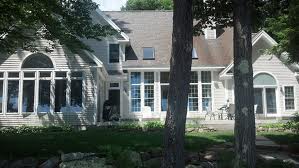Do Your Homework and Check the Fine Print When Buying Homeowner’s Insurance Coverage
By Mark J. Donovan
|
|
When it comes to purchasing a home, most home buyers do their homework upfront. They carefully evaluate the towns and neighborhoods where they think they might be interested in buying a home. They check out the schools, and they visit many homes on the market and compare prices, floorplans and amenities. However, when it comes to buying homeowners insurance, most homebuyers wrongfully accept whoever the real estate agent recommends.
This is a huge mistake. Just like buying auto insurance and life insurance there are many insurance companies that offer homeowners insurance with varying plans and costs. |
Each insurance company has its pros and cons, and each has it’s own policies, pricing structures, and options for homeowners insurance. Thus, by just going ahead and purchasing homeowners insurance from the company that the real estate agent recommends, you’re doing yourself a disservice.
| So let’s be clear on what homeowners insurance is. It is simply a legal agreement between a homeowner and the insurance company, that in consideration for the homeowner paying monthly or annually for homeowner insurance, the insurance company will compensate the homeowner in the even the home is significantly damaged or destroyed.
In addition, depending upon the homeowner insurance options that are included in the agreement, the homeowner insurance policy may also include coverage for the contents of the home, liability protection, and temporary displacement costs while the exterior and interior structure of the home is repaired. |
 |
And within these options there are even more options, e.g. full replacement value coverage for the contents of the home versus a pro-rated value for them.
Structural Coverage
The basics for any homeowners insurance policy is coverage for the structure of the home. In the event the home is damaged or destroyed, e.g. by fire or hurricane, the insurance policy provides financial compensation to repair or rebuild the home. Most homeowners insurance polices don’t cover flood and earthquake damage since they are considered acts of God. However, you can often pay additional money for protection against these types of causes of structural damage to your home.
Another area to evaluate when looking into homeowners insurance is whether or not their homeowner insurance policies cover garages and porches attached to the home, as well as out buildings on the same property. The coverage can vary between homeowner insurance polices. Consequently it’s important to understand what could be excluded from coverage in each homeowner insurance policy offered to you.
Personal Liability Protection
Liability insurance provides protection to you, your family and pets in the event that they somehow injure someone or damage someone else’s property while it is on your property (e.g. car). Liability insurance also protects you in the event a guest at your house accidentally gets injured while in your home. Liability protection is typically limited so it is important to find out how much coverage is offered with each homeowner’s insurance policy offered to you.
| Temporary Displacement
If your home is damaged, for example in the event the pipes freeze and burst, then the homeowners insurance policy could provide for temporary displacement. This benefit allows you to stay at a hotel, for example, while your home is repaired. It also provides partial compensation for living expenses, such as food and other ancillary items while being temporarily displaced. Temporary displacement coverage has time limits so it is important to understand specifically what each homeowner insurance policy offers you prior to committing to one. |
|
So make sure you do your homework when buying a homeowners insurance policy. They are not all the same and should require the same amount of attention as any other item in the process of purchasing a home.
For help on building a home addition, see HomeAdditionPlus.com’s Home Addition Bid Sheets. Our Home Addition Bid Sheets provide you with the knowledge and information on how to plan a home addition project, and what to look for when hiring contractors. They also include detailed cost breakdown tables and spreadsheets for estimating your own new home addition building costs.
Related Information
- Green Home Building – Still not the Wave of the Future
- Has Investing in Your Home Become Financial Suicide?
- Why this Key Feature Sells Homes
Free Home Addition Price Quotes with No Obligation!
Fill out our 3-5 minute quick and easy form, and receive a free price quote on a house addition from one of our prescreened and licensed home addition contractors. This process is free and there is no obligation to continue once you receive your house addition price estimate.

